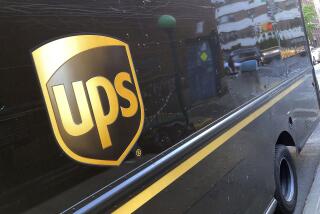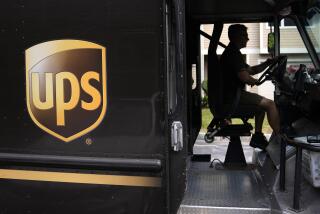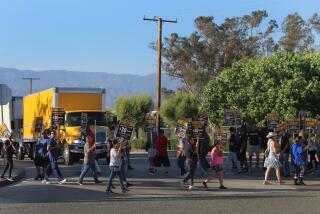UPS Chairman, CEO Kelly to Step Down
- Share via
James P. Kelly, who led United Parcel Service Inc. through one of its darkest trials and then spearheaded some of its greatest achievements, Thursday announced his retirement as chairman and chief executive of the giant delivery company, effective in January.
Kelly, 58, will be succeeded by Michael L. Eskew, UPS’ vice chairman and executive vice president. Eskew, 52, was considered Kelly’s likely heir after he was named to his current posts a year ago.
By most corporate standards, Kelly is relatively young to step down as chief executive. But UPS chairmen typically retire at a relatively young age after serving about five years, mainly because by then they have spent 30 or 40 years at the company.
Indeed, UPS’ decision to tap Eskew reflects the Atlanta-based company’s long-standing tradition of having an orderly succession and promoting from within. But Eskew’s selection also reflects his skill in exploiting technology, which is increasingly crucial to UPS as it leverages its vast delivery system to expand its role in electronic commerce and other services that rely heavily on the Internet.
“I don’t think they’ll skip a beat” as Eskew takes over, said Rick Black, an analyst at Blaylock & Partners, an investment firm in New York.
Kelly, in a statement, said, “UPS is very lucky to have a person with Mike Eskew’s knowledge, experience and respect ready to assume the leadership of our company.” Both men were meeting with UPS’ directors Thursday and were not available to comment.
But Eskew has his work cut out. UPS is suffering, with the rest of corporate America, from the sluggish U.S. economy. The company’s package volume growth and earnings have weakened considerably in recent quarters. Plus, the company faces intense competition from FedEx Corp. and other rivals.
UPS’ profit in the first half of 2001, excluding one-time gains and charges, fell 12% from a year earlier to $1.2 billion, as total revenue rose only 4% to $15 billion. Revenue from UPS’ core U.S. domestic package deliveries edged up only 2% from a year earlier.
Kelly, a tall, sturdy man whose accent still reveals his New Jersey roots, steered UPS through some of the most turbulent times in its 94-year history. Not long after becoming chief executive, he led UPS’ showdown with the Teamsters union over a new contract; their impasse resulted in a 15-day Teamsters strike in 1997 that badly disrupted not only UPS’ service but also the entire U.S. economy.
UPS--with a fleet of 152,500 vehicles, 238 aircraft and 359,000 employees--is the country’s largest package delivery concern and one of the largest non-government U.S. employers. By moving an average of nearly 14 million parcels every day, the company itself is glue that helps hold together the economy.
The strike sparked widespread frustration among thousands of companies, especially small businesses, that rely on the big shipper. After decades of being known for its reliability, Big Brown--as the company is dubbed because of its chocolate-brown trucks--suddenly saw its reputation eroded, and the strike cost UPS about $700 million in losses.
But the walkout also became a turning point for UPS, a “wake-up call,” as Kelly has put it.
UPS went to work rebuilding its business and customer relations, and excelled at both. By 2000, the company’s shipment volumes, revenue and profit all were higher than pre-strike levels. A major contributor was the surge in online commerce, which boosted UPS’ delivery of goods to businesses and consumers alike.
Then in November 1999, Kelly took UPS through one of its most dramatic changes ever: After nine decades of being privately owned, mostly by its senior managers and other employees and retirees, UPS had its initial public stock offering. The offering raised $5.5 billion, ranking as one of the largest IPOs in U.S. history, and enriching thousands of UPS worker-owners.
But the stock has languished recently in tandem with UPS’ performance. After going public at $50 a share, the stock quickly jumped as high as $76 but then fell back. It has been trading mostly between $55 and $65. It closed Thursday at $55.75 a share, down 9 cents, on the New York Stock Exchange.
Kelly’s reign achieved another milestone last fall, when UPS beat out several rivals and won rights to join the few air carriers making flights to China, one of the world’s fastest-growing markets for freight traffic. UPS’ flights to China include trips originating at Ontario, one of the company’s major U.S. hubs.
Kelly started as a UPS truck driver in 1964 and steadily rose to the top job. Once there, he was the bridge that connected the unorthodox, rigorous operating style UPS has followed since its founding in 1907 with its aggressive expansion into technological fields that demand facile, visionary management.
More to Read
Inside the business of entertainment
The Wide Shot brings you news, analysis and insights on everything from streaming wars to production — and what it all means for the future.
You may occasionally receive promotional content from the Los Angeles Times.











